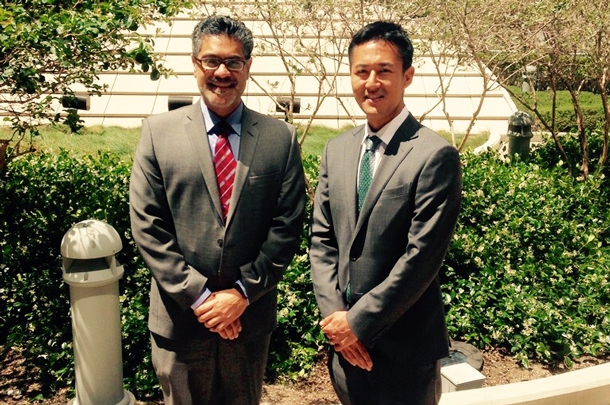The Keck Medicine of USC Department of Radiology has been awarded a grant of more than half a million dollars to provide free lung cancer screening via low-dose CT scans for residents of some of the poorest communities in Los Angeles County.
The $503,560 in funding from the California Community Foundation will finance two years of low-dose CTs for people at high risk of lung cancer living in the Centinela Valley, which includes Inglewood, parts of Hawthorne, Lennox, Los Angeles, Watts, Compton and Lawndale.
Recent research indicates that residents in the Centinela Valley area tend to smoke and develop lung cancer at higher rates than in other Southern California communities.
“We are targeting a very high-risk population that happens to be faced with a lot of barriers to health care access,” said Christopher Lee, MD, associate professor of clinical radiology at the Keck School of Medicine of USC. “Lung cancer is the leading cause of cancer death for both men and women in this country, but it particularly afflicts those living within underserved communities. This is a great opportunity to be able to reach out to this population and educate them on the importance of early detection of lung cancer, as well as smoking cessation for the prevention of lung cancer. Hopefully, we can save some lives in the process.”
The Department of Radiology has partnered with USC’s Health Sciences Campus Community Partnerships Office and the Norris Comprehensive Cancer Center, as well as the Watts Health Foundation, to enroll residents for lung cancer screening.
In March, the department earned designation by the American College of Radiology as an approved Lung Screening Center. The national organization recognizes facilities committed to providing quality screening care to patients at the highest risk for lung cancer. The department is also recognized as a Screening Center of Excellence by the Lung Cancer Alliance.
As a part of the grant, starting in June, the Department of Radiology plans to screen about 400 Centinela Valley residents over the two years. To facilitate the screening process, transportation to and from Keck Medical Center of USC will be provided.
Residents will also have access to local smoking cessation resources. If an abnormality is detected on the low-dose CT, patients will be linked to appropriate follow-up and treatment resources.
“Our goal is to eliminate barriers as much as possible, especially financial barriers,” Lee said. “It’s really important to reach out to this population because they are the population at highest risk for developing lung cancer.”
One of the largest randomized controlled clinical trials in National Cancer Institute history showed that low-dose CT screening could reduce lung cancer mortality rates by at least 20 percent, a significant improvement for a cancer that currently has a five-year overall survival rate of only 17 percent.
A CT scan is an imaging procedure that creates a series of detailed cross-sectional X-ray images of the lungs. A low-dose CT does not require intravenous contrast, takes less than five minutes to perform and is performed with about one-fifth of the radiation dose of a conventional CT scan.
The grant will allow the FDA-approved technology to be accessible to a large underserved population, said Zul Surani, executive director for community partnerships for USC’s Health Sciences Campus.
“How do you take technology that’s proven effective and underutilized to people who need it the most? To me, that’s a matter of justice,” Surani said. “People who are uninsured and underserved are in need of this new screening modality, yet they don’t have access to it. How do we bridge that gap? This grant will help us do exactly that.”
The California Community Foundation is a public charity focused on philanthropy and civic engagement across L.A. County.
“This grant will directly help some of the city’s residents who are most at-risk for lung cancer,” said California Community Foundation Program Officer Rosemary Veniegas, PhD. “Keck Medicine of USC is a strong community partner that will be able to provide Centinela Valley residents with cutting edge technology that could help detect cancers and, ultimately, save many lives.”
— Douglas Morino


